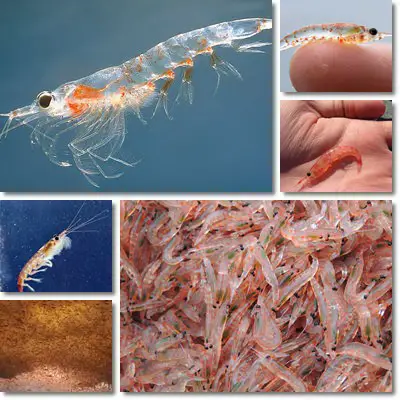Krill oil is an oil made from a species of Antarctic krill called Euphausia superba. The oil extracted from these tiny crustaceans has a deep red color because of its astaxanthin content, a type of carotenoid also found in Pacific krill and Arctic shrimp. Krill oil is a rich source of Omega-3 fatty acids, hence its use for the prevention and treatment of heart disease as well as other associated health problems. Moreover, it is a source of antioxidants such as the carotenoid astaxanthin and vitamins A and E.
The reason why krill oil has become so popular is because it provides us with two special types of healthy Omega-3 fatty acids we cannot obtain from plant sources, namely DHA and EPA. While plant Omega-3 is also important for keeping healthy, marine Omega-3 is believed to be the healthiest because it is pivotal for nervous system health and proper brain development, directly influencing thinking, learning, memorizing as well as other cognitive processes.

The purported health benefits of krill oil are mostly a result of its Omega-3 fatty acids content. Omega-3 fatty acids are basically healthy polyunsaturated fats that contribute to the good functioning of our brain, improving memory and learning, ease digestion, lower cholesterol, offer antioxidant protection and contribute to cardiovascular health in general. Krill oil and a variety of fish oils such as cod liver oil are all great sources of the fatty acid.
Marine oils such as krill oil are generally great sources of Omega-3 and provide two distinct types of the fatty acid: EPA and DHA. Some plant sources, on the other hand, contain a type of Omega-3 called ALA (walnuts, flaxseeds and their oils, olive oil and so on). Recent research has shown that while we do need the Omega-3 in plants for keeping healthy, the forms we get from marine sources are actually much more important for our health, especially DHA (find out more about the best food sources of Omega-3 fatty acids on the fish and seafood page).
Docosahexaenoic acid or DHA has been found to be an essential nutrient for the brain, meaning it is crucial for brain health. After all, our brain is made up of fats. And while our body can synthesize it from ALA, tests reveal the resulted amounts to be too little to generate any health benefit. As a result, consuming fish and their derivate essential oils, krill oil or other marine oils is imperative for a good health.

What’s in krill oil capsules?
Krill oil capsules owe their health benefits to several key-compounds such as:
- Polyunsaturated Omega-3 fatty acids
- Antioxidants in the form of carotenoids
- Vitamin A
- Vitamin E
- Phosphatidylcholine
What is krill good for?
As for health effects, these are the top 5 uses and benefits of krill oil:
Good for high blood cholesterol
According to research, the healthy Omega-3 fatty acids in krill oil help lower high LDL (bad) cholesterol levels, as well as triglyceride (a type of blood fat) levels. At the same time, being healthy fats themselves, the Omega-3 fatty acids in the oil contribute to higher HDL (good) cholesterol levels in the blood. Their action is believed to be more powerful because they are carried into the body in the form of phospholipids, a mechanism which is believed to be superior, hence the preference for krill oil over fish oil.
Keeping cholesterol levels under control is pivotal for preventing plaque buildups on artery walls that will eventually lead to atherosclerosis and subsequent cardiovascular problems. Moreover, Omega-3 fatty acids have an antioxidant effect and thus further contribute to maintaining healthy blood vessels.
Brain food with benefits for brain health
It is more or less common knowledge that our brain is made from and functions on fats. As a result, it requires good fats such as Omega-3 from krill oil, fish and derivate oils to keep functioning at maximum capacity. Fish and krill oil are thus used to support concentration, improve memory and learning abilities and preserve brain health, preventing cognitive decline associated with old age. Some specialists even recommend krill oil for mental disorders such as Alzheimer’s disease, schizophrenia or bipolar disorder.
Benefits for fetal brain development
Krill oil is a good option for pregnant women for two reasons. First, it poses no risks of heavy metal contamination to the mother or baby, hence its safety for use during pregnancy. Because krill are so small, they do no concentrate organic mercury and other contaminants like large fish such as tuna do. Moreover, krill byproducts such as krill oil are purified so that there are no heavy metal contamination risks, making krill oil one of the safest sources of seafood during pregnancy.
More important, krill oil has a high content of Omega-3 fatty acids which are highly beneficial for good fetal brain development. Omega-3 fatty acids, particularly EPA and DHA forms in non-plant sources such as krill, fish and other seafood, help build the brain and nervous system. Nevertheless, expecting mothers should consult with their doctors about any supplements they consider taking while pregnant.
Benefits for skin health and wound healing
The high amounts of Omega-3 fatty acids in krill oil exert an antioxidant and anti-inflammatory action on the skin and, as a result, can help calm eruptions, even reduce acne and the appearance of associated scars, as well as contribute to faster and better wound healing. Fatty acids in krill oil help build skin cell membranes which are responsible for maintaining adequate levels of skin hydration.
Krill oil supplements can give skin and hair a healthy glow thanks to Omega-3 fatty acids and vitamins A and E which contribute to improving skin and hair appearance and health via anti-inflammatory, reparative and antioxidant activities. The carotenoid astaxanthin in krill oil in particular has potent free radical scavenging and reparative properties, with important benefits for skin health.
Liver repair
Recent research suggests phosphatidylcholines, a type of phospholipids such as those found in krill oil, may exert a healing effect on liver cells, hence the claim krill oil may encourage liver repair and exert hepatoprotective properties. Krill oil supplements are generally well-tolerated by most people. However, some people report mild side effects such a belching, flatulence, stomach growling or stomach upset, indigestion, a bad fishy taste in the mouth, burping that smells like fish, even localized or extended rashes in some cases.
Considerations
While krill oil is a good option for anyone fearing a potential heavy metal intoxication from fish sources, you still need to choose your brands carefully so you get what you are paying for and do not expose yourself to any risks. At the same time, there is the problem of the ecological impact of krill harvesting. Although believed to be an abundant species and despite marine farms being set up, krill is currently being caught by the tons to make krill oil, fishing baits or for feeding various animals.
But whales, seals, penguins, squid, some fish species and several other marine species rely heavily on krill for survival. Man’s intervention is depriving them of much needed sustenance which, in turn, may negatively impact fragile ecosystems already under siege by the shrinking ice masses. So, how can we keep healthy and minimize our impact on nature?
The number one question we should be asking ourselves here is: do we really need krill oil? Well, we shouldn’t. As long as we enjoy a balanced and varied diet, include at least 2-3 fish servings in our weekly diet and numerous fresh fruits and vegetables and try to eat mostly home-cooked meals instead of fast food, then the majority of us will not need to supplement with any form of marine oil, leaving the krill for whales, seals and penguins.
